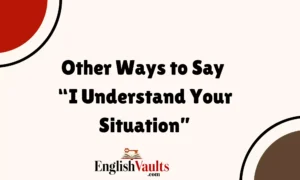In various aspects of life, from personal relationships to professional settings, effective communication is essential. The phrase “We need to talk” is often loaded with tension and anxiety, making it challenging to initiate important discussions. Whether you’re addressing a sensitive issue with a friend, discussing a concern with a colleague, or even broaching a delicate topic with a partner, finding the right words can make all the difference. In this article, we’ll explore 27 alternative ways to say “We need to talk” that can help ease the tension and facilitate open, honest conversations. From light-hearted approaches to more serious tones, these phrases can assist you in communicating your message effectively while maintaining a respectful dialogue.
List of 27 Other Ways to Say “We Need to Talk”
- “Can We Go Over Something Together?”
- “I Think It’s Time We Talk”
- “I’d Love Your Insight on Something”
- “Can We Dive Into a Topic?”
- “Let’s Take a Moment to Connect”
- “I Want to Share My Thoughts with You”
- “I Think We Should Catch Up”
- “I Have a Concern I’d Like to Discuss”
- “I Want to Clear the Air”
- “I’d Like to Explore Some Feelings”
- “Let’s Discuss Our Next Steps”
- “Can We Set Aside Some Time?”
- “I Have Some Feedback for You”
- “There’s Something I’d Like to Address”
- “Let’s Open the Conversation”
- “Can We Discuss Some Changes?”
- “I Want to Hear Your Thoughts”
- “I Think We Should Reconnect”
- “Let’s Talk About It”
- “Can We Review Some Things Together?”
- “I Think It’s Important We Talk”
- “Let’s Have a Candid Conversation”
1. “Can We Chat for a Moment?”
Sometimes, a simple and casual approach can set the right tone for a conversation. This phrase suggests a willingness to listen and engage, making it less intimidating for the other person.
Scenario Example:
Subject: Quick Check-in
Email Body:
Hi Tomi,
I hope you’re having a good day! Can we chat for a moment? I’d like to discuss a few things about our recent project and get your thoughts on some ideas I have. Let me know when you’re free!
Best, Jerry
2. “I’d Like to Discuss Something Important”
This phrase indicates the significance of the conversation without creating unnecessary stress. It allows the other person to prepare for a more serious discussion.
Scenario Example:
Subject: Important Discussion
Email Body:
Hi Tomi,
I hope you’re doing well. I’d like to discuss something important regarding our upcoming deadline. I think we must align our strategies to ensure success. Please let me know when you can meet!
Thanks, Jerry
3. “Can We Have a Heart-to-Heart?”
Using the phrase “heart-to-heart” signals a desire for an open and honest discussion, emphasizing vulnerability and sincerity.
Scenario Example:
Subject: Heart-to-Heart Time
Email Body:
Hi Tomi,
I hope you’re having a good week! Can we have a heart-to-heart? There are a few feelings I’d like to share that I think are important for our friendship. Let’s find a time to talk.
Warm regards, Jerry
4. “Let’s Touch Base”
This phrase is ideal for professional settings, suggesting a quick discussion to clarify any concerns or updates.
Scenario Example:
Subject: Quick Touch Base
Email Body:
Hi Tomi,
I wanted to reach out and let’s touch base about the project. I think a brief conversation would help us stay on the same page and address any outstanding issues. Are you available this afternoon?
Best, Jerry
5. “I Have Something on My Mind”
Opening a conversation with this phrase invites curiosity and encourages the other person to engage in a dialogue.
Scenario Example:
Subject: Something on My Mind
Email Body:
Hi Tomi,
I hope you’re doing well! I have something on my mind that I’d like to share with you. It’s been weighing on me, and I believe discussing it could help us both. Can we set up a time to talk?
Best wishes, Jerry
6. “Can We Go Over Something Together?”
This phrase emphasizes collaboration and suggests that both parties will contribute to the conversation, easing any pressure.
Scenario Example:
Subject: Collaboration Discussion
Email Body:
Hi Tomi,
I wanted to see if we could go over something together regarding our recent findings. I believe our insights could lead to a more effective approach. When would be a good time for you?
Cheers, Jerry
7. “I Think It’s Time We Talk”
This phrase conveys a sense of urgency while remaining respectful, indicating that the matter at hand requires immediate attention.
Scenario Example:
Subject: Time to Talk
Email Body:
Hi Tomi,
I hope you’re well! I think it’s time we talk about some changes happening in the team. We need to address these matters openly. Let’s find a time to discuss.
Take care, Jerry
8. “I’d Love Your Insight on Something”
Positioning the conversation as an opportunity for the other person to provide their perspective can foster a more relaxed environment.
Scenario Example:
Subject: Seeking Your Insight
Email Body:
Hi Tomi,
I hope your week is going well! I’d love your insight on something I’ve been thinking about. Your perspective is valuable, and I think it would help clarify my thoughts. Let me know when you’re free to chat!
Best, Jerry
9. “Can We Dive Into a Topic?”
This phrase suggests an exploration of a subject, indicating a willingness to engage deeply and thoughtfully.
Scenario Example:
Subject: Topic Discussion
Email Body:
Hi Tomi,
I wanted to reach out and see if we can dive into a topic that’s been on my mind lately. I believe a discussion could lead to some great insights for both of us. Let me know when you’re available!
Best regards, Jerry
10. “Let’s Take a Moment to Connect”
This approach emphasizes the importance of connection and understanding, making it suitable for personal discussions.
Scenario Example:
Subject: Connecting Soon
Email Body:
Hi Tomi,
I hope you’re having a good day! Let’s take a moment to connect about how things have been going lately. I think it’s essential to check in with each other. When would be a good time?
Warmly, Jerry
11. “I Want to Share My Thoughts with You”
This phrase opens the floor for a personal exchange, indicating that the conversation will involve sharing feelings or opinions.
Scenario Example:
Subject: Thoughts to Share
Email Body:
Hi Tomi,
I hope all is well! I want to share my thoughts with you regarding our recent collaboration. I believe discussing this will help us understand each other better. Let’s set up a time to chat!
Best, Jerry
12. “I Think We Should Catch Up”
A casual and friendly approach, this phrase suggests a relaxed conversation without high stakes.
Scenario Example:
Subject: Catching Up
Email Body:
Hi Tomi,
I wanted to see if we should catch up soon. I’ve been thinking about some things, and I’d love to hear how you’re doing as well. When are you free to meet?
Cheers, Jerry
13. “I Have a Concern I’d Like to Discuss”
Using the word “concern” clearly indicates that the conversation will address an issue, but it’s phrased respectfully.
Scenario Example:
Subject: Concern Discussion
Email Body:
Hi Tomi,
I hope your day is going well. I have a concern I’d like to discuss regarding our last meeting. I believe addressing this could improve our teamwork. Let me know when we can talk!
Best wishes, Jerry
14. “I Want to Clear the Air”
This phrase is effective when there may be misunderstandings or tension, signaling a desire for clarity and resolution.
Scenario Example:
Subject: Clearing the Air
Email Body:
Hi Tomi,
I hope you’re doing well! I want to clear the air about a few things that have been bothering me. It’s important to me that we have an open dialogue. Can we meet soon?
Take care, Jerry
15. “I’d Like to Explore Some Feelings”
By framing the conversation around feelings, you indicate that it will involve emotional content, fostering empathy.
Scenario Example:
Subject: Exploring Feelings
Email Body:
Hi Tomi,
I wanted to reach out because I’d like to explore some feelings that have come up for me recently. I think it would be beneficial for both of us. Let me know when you have time to talk.
Warm regards, Jerry
16. “Let’s Discuss Our Next Steps”
This phrase is suitable for professional settings where the focus is on moving forward and alleviating anxiety about discussing sensitive topics.
Scenario Example:
Subject: Next Steps Discussion
Email Body:
Hi Tomi,
I hope you’re having a productive week! Let’s discuss our next steps for the project to ensure we’re on the right track. I’d love to hear your thoughts. When can we meet?
Best, Jerry
17. “Can We Set Aside Some Time?”
This phrase suggests a dedicated conversation, indicating the importance of the topic while keeping it low-pressure.
Scenario Example:
Subject: Setting Aside Time
Email Body:
Hi Tomi,
I hope all is well! Can we set aside some time to talk about our recent discussions? I think it would be helpful for us to align our ideas moving forward. Let me know when you’re available.
Best regards, Jerry
18. “I Have Some Feedback for You”
In a professional setting, this phrase indicates a constructive conversation aimed at improvement, easing anxiety about the discussion.
Scenario Example:
Subject: Feedback Session
Email Body:
Hi Tomi,
I wanted to reach out because I have some feedback for you on your recent presentation. I think it could really enhance our future efforts. Let’s find a time to discuss this in detail.
Thanks, Jerry
19. “There’s Something I’d Like to Address”
This phrase acknowledges that an issue exists, signaling readiness to tackle it without assigning blame.
Scenario Example:
Subject: Addressing an Issue
Email Body:
Hi Tomi,
I hope you’re doing well! There’s something I’d like to address regarding our last team meeting. I believe it’s important for us to clarify a few points to move forward effectively. When can we meet to discuss this?
Best, Jerry
20. “Let’s Open the Conversation”
This phrase encourages a two-way dialogue and signals that you’re open to hearing the other person’s perspective as well.
Scenario Example:
Subject: Opening the Conversation
Email Body:
Hi Tomi,
I wanted to touch base because let’s open the conversation about how we can improve our collaboration. I think both of our insights would be beneficial. Let me know your availability!
Warm regards, Jerry
21. “Can We Discuss Some Changes?”
This phrase indicates that there may be significant alterations ahead, prompting a conversation without sounding too ominous.
Scenario Example:
Subject: Discussion on Changes
Email Body:
Hi Tomi,
I hope your week is going well! Can we discuss some changes coming up in our project? We need to align our expectations moving forward. When are you free to meet?
Best wishes, Jerry
22. “I Want to Hear Your Thoughts”
Framing the conversation as an opportunity for input can reduce anxiety and encourage the other person to engage more openly.
Scenario Example:
Subject: Hearing Your Thoughts
Email Body:
Hi Tomi,
I hope you’re having a good day! I want to hear your thoughts on some recent developments in our team. Your perspective is valuable, and I believe it would help us both. Let’s set up a time to chat!
Cheers, Jerry
23. “I Think We Should Reconnect”
This phrase suggests a more personal approach, emphasizing the importance of maintaining a strong connection.
Scenario Example:
Subject: Reconnecting
Email Body:
Hi Tomi,
I hope all is well with you! I think we should reconnect and discuss how things have been. I feel it’s important for us to stay aligned, especially with everything happening. When would be a good time for you?
Warmly, Jerry
24. “Let’s Talk About It”
A straightforward yet casual phrase that conveys openness and readiness to engage in discussion.
Scenario Example:
Subject: Let’s Talk
Email Body:
Hi Tomi,
I hope you’re doing great! Let’s talk about it when you have a moment. There’s something I’ve been thinking about that I’d like to share. Let me know your availability!
Best, Jerry
25. “Can We Review Some Things Together?”
This phrase implies a collaborative discussion aimed at improvement, making it less intimidating for the other person.
Scenario Example:
Subject: Review Discussion
Email Body:
Hi Tomi,
I wanted to reach out because can we review some things together about our current strategies? I think it could lead to some valuable insights. Let me know when you’re free!
Best regards, Jerry
26. “I Think It’s Important We Talk”
This phrase acknowledges the significance of the conversation while maintaining a respectful tone.
Scenario Example:
Subject: Important Talk
Email Body:
Hi Tomi,
I hope you’re having a good day! I think it’s important we talk about some recent developments that could impact our project. Can we schedule a time to discuss this?
Thanks, Jerry
27. “Let’s Have a Candid Conversation”
This phrase invites transparency and encourages open dialogue, indicating that the conversation will involve honesty.
Scenario Example:
Subject: Candid Conversation
Email Body:
Hi Tomi,
I wanted to see if we could have a candid conversation about some things that have been on my mind. I believe it’s essential for us to be honest with each other to strengthen our teamwork. When are you available?
Take care, Jerry
Conclusion
Finding the right way to initiate a conversation can make all the difference in ensuring effective communication. The 27 alternative phrases presented in this article offer various approaches to address important topics while minimizing anxiety. By choosing the right words, you can create an atmosphere of understanding and collaboration, whether in personal relationships or professional settings.
When preparing for a conversation, remember that tone and context matter just as much as the words themselves. Consider your relationship with the person and the nature of the discussion to select the most suitable phrase. Ultimately, the goal is to foster open communication that leads to positive outcomes. By applying these alternatives, you can navigate tough discussions with confidence and clarity, enhancing your relationships and promoting mutual.










